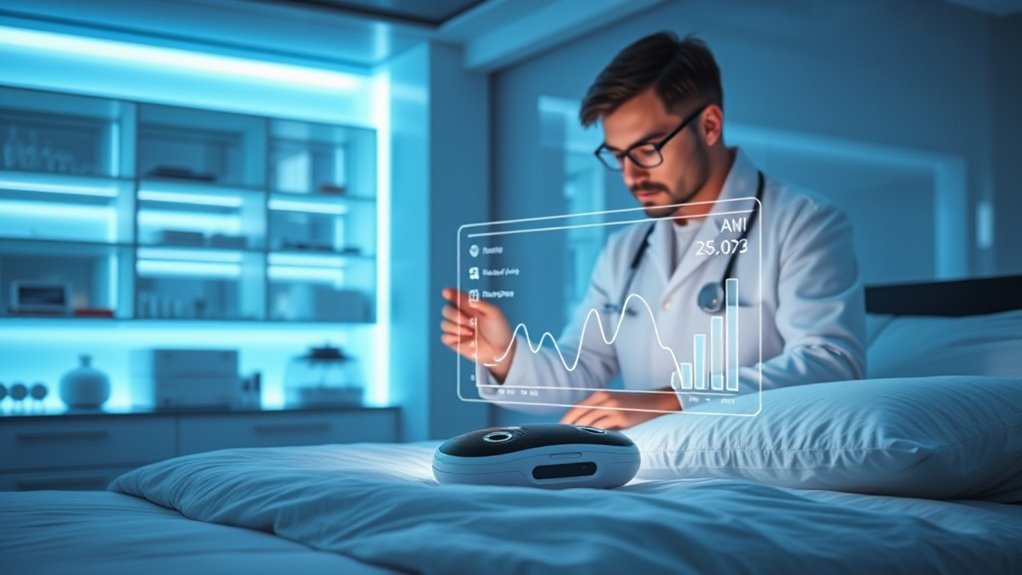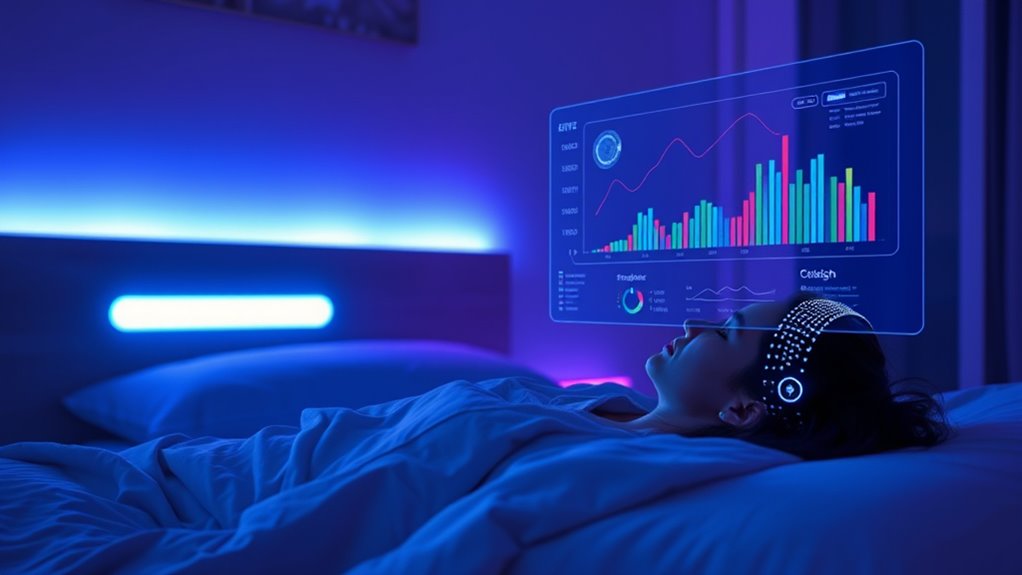AI helps optimize sleep disorder treatments by analyzing vast physiological data to give you personalized, accurate diagnoses and therapies. It uses advanced algorithms to detect early signs, predict how you’ll respond to treatments, and improve adherence through tailored strategies. By focusing on your unique sleep patterns and clinical factors, AI increases success rates and helps prevent complications. Keep exploring to discover how this innovative approach can transform your sleep health and overall quality of life.
Key Takeaways
- AI analyzes complex physiological data to improve diagnosis accuracy and detect sleep disorders early.
- Personalized treatment strategies are developed by AI based on individual sleep patterns and anatomical features.
- Machine learning models forecast treatment adherence and disease progression for proactive interventions.
- AI supports ethical data management, ensuring patient privacy and compliance with legal standards.
- Population trend analysis guides public health policies and enhances overall sleep disorder management.

Artificial intelligence is transforming sleep disorder treatments by enabling more accurate diagnoses, personalized therapies, and better patient outcomes. When you work with AI, you’re tapping into a powerful tool that can analyze vast amounts of data to identify patterns and relationships among patient traits, sleep behaviors, and responses to treatments. This means diagnoses become more precise, reducing errors and enabling earlier detection of issues like sleep apnea or insomnia. AI’s ability to process complex physiological data goes beyond traditional methods, helping you understand the nuances of each patient’s condition and tailor interventions accordingly. For example, AI can analyze signals from sleep studies to improve event detection during polysomnography, making the process faster and more reliable.
As you incorporate AI into your practice, ethical and legal considerations become essential. Protecting patient privacy and guaranteeing data is used responsibly are top priorities. You must navigate regulations and establish protocols that keep sensitive information secure while leveraging AI’s capabilities. Proper management of data fosters trust and ensures that technological advancements benefit patients without compromising their rights. Additionally, ongoing research into AI Security ensures that AI systems remain resilient against vulnerabilities and jailbreaking attempts, safeguarding patient data and system integrity. Incorporating robust encryption and security measures is fundamental to maintaining confidence in AI-driven healthcare solutions. Moreover, integrating AI security practices helps you stay compliant with evolving data protection regulations, reducing potential legal risks.
Technological advancements like machine learning and deep learning are integral to these improvements. They allow algorithms to learn from diverse datasets, continuously refining their accuracy. These technologies enable early detection of sleep disorders, often before symptoms become severe, leading to timely interventions that improve long-term outcomes. AI also plays an indispensable role in diagnosing complex cases like obstructive sleep apnea by analyzing physiological data beyond traditional indices, giving you a more well-rounded understanding of each patient’s condition. Moreover, data analysis techniques are crucial for uncovering hidden patterns that can inform more effective treatments. As these technologies advance, they also contribute to predictive analytics, helping you forecast disease progression and optimize treatment plans proactively.
Personalized treatment strategies are another major benefit AI offers. By analyzing individual data—such as sleep patterns, anatomical features, and ventilatory control—AI helps you develop tailored interventions that are more effective. AI models can predict key characteristics like airway collapsibility, guiding decisions on whether a patient might benefit from specific therapies. Additionally, AI can forecast treatment adherence, alerting you early if a patient is at risk of non-compliance, so you can intervene proactively. Longitudinal data collection further enhances treatment planning by tracking progress over time and adjusting strategies as needed.
Ultimately, AI enhances patient outcomes by increasing treatment success rates and adherence. It helps you stratify risk, identify patients who need more intensive care, and predict prognosis with greater confidence. By analyzing trends across populations, AI also contributes to public health initiatives aimed at reducing sleep disorder prevalence. When you leverage AI thoughtfully, you’re not just improving individual care—you’re advancing the entire field of sleep medicine toward more efficient, accurate, and personalized treatment approaches. Embracing innovative technologies like AI is essential for staying at the forefront of this rapidly evolving field.
Frequently Asked Questions
How Does AI Personalize Sleep Disorder Treatment Plans?
You might wonder how treatment plans are personalized for sleep disorders. AI analyzes your unique sleep data, genetics, and health history to craft tailored strategies. It uses machine learning to predict how you’ll respond to different therapies, adjust treatments over time, and improve adherence. By integrating insights from various specialists and monitoring your progress continuously, AI helps develop highly individualized plans that target your specific needs, enhancing your sleep quality and overall health.
What Are the Privacy Concerns With AI Sleep Data?
Imagine your sleep data as a secret recipe, shared with sneaky third-party chefs keen to spice up targeted ads or hike insurance premiums. You’re trusting companies with sensitive info, but transparency’s a mystery, and breaches lurk like burglars waiting to steal your snooze secrets. Data can be misused, shared, or hacked, making privacy a fragile pillow—so, stay alert and demand clear policies and strong security to protect your sleep stories.
Can AI Predict Future Sleep Issues Accurately?
You’re wondering if AI can accurately predict future sleep issues. The answer is yes, AI models are increasingly effective, analyzing current data to identify risk factors and forecast potential problems. By using machine learning algorithms and all-encompassing data sources, AI can stratify your risk and enable early interventions. This proactive approach helps you address sleep concerns before they worsen, making AI a powerful tool for long-term sleep health management.
How Accessible Are Ai-Based Sleep Treatments Globally?
You’re wondering how accessible AI-based sleep treatments are worldwide. Currently, digital platforms like Sleepio make these treatments widely available, especially in developed regions. They offer personalized, cost-effective solutions that can be accessed from home. However, in developing areas, limited technology access, low awareness, and economic constraints restrict availability. Despite growing global interest and market expansion, accessibility varies greatly depending on region, infrastructure, and awareness levels.
What Are the Limitations of AI in Sleep Medicine?
You should recognize that AI in sleep medicine faces several limitations. It struggles with biased and inconsistent data, making accurate diagnoses difficult. Privacy concerns and integration challenges hinder clinical use, while AI’s “black box” nature reduces transparency. Errors in event detection and the need for diverse, high-quality data also limit its effectiveness. Additionally, regulatory hurdles, costs, and public trust issues slow widespread adoption.
Conclusion
As you embrace AI’s role in sleep disorder treatments, you’re opening a doorway to a night’s symphony of restful slumber. Like a skilled conductor, AI guides your sleep patterns toward harmony, unraveling tangled rhythms with precision. With every algorithmic improvement, you’re weaving a tapestry of hope and renewal, transforming restless nights into peaceful dreams. In this dance between technology and biology, you hold the key to revealing your most restorative sleep yet.










